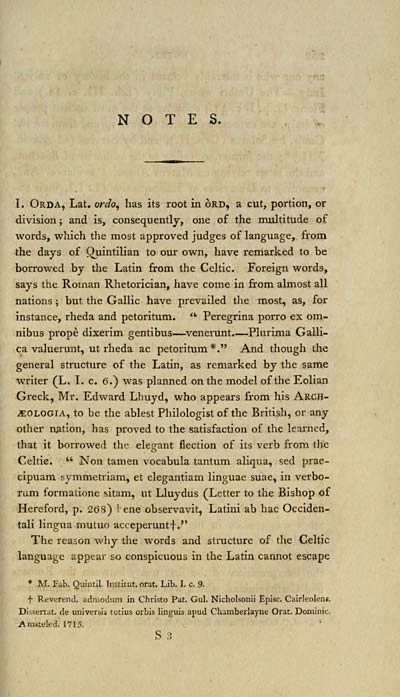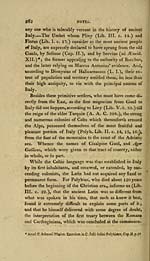J. F. Campbell Collection > Report of the Committee of the Highland Society of Scotland, appointed to inquire into the nature and authenticity of the poems of Ossian
(443)
Download files
Complete book:
Individual page:
Thumbnail gallery: Grid view | List view

NOTES.
I. Orda, Lat. ordo^ has its root in ÒRD, a cut, portion, or
division; and is, consequently, one of the multitude of
words, which the most approved judges of language, from
the days of Quintilian to our own, have remarked to be
borrowed by the Latin from the Celtic. Foreign words,
says the Roman Rhetorician, have come in from almost all
nations ; but the Gallic have prevailed the most, as, for
instance, rheda and petoritum. '* Peregrina porro ex om-
nibus propè dixerim gentibus — venerunt. — Plurima Galli-
ca valuerunt, ut rheda ac petoritum *." And though the
general structure of the Latin, as remarked by the same
writer (L. L c. 6.) was planned on the model of the Eolian
Greek, Mr. Edward Lhuyd, who appears from his Arch-
jEOLggia, to be the ablest Philologist of the British, or any
other nation, has proved to the satisfaction of the learned,
that it borrowed the elegant flection of its verb from the
Celtic. " Non tamen vocabula tantum aliqna, sed prae-
cipuam symmetriam, et elegantiam linguae suae, in verbo-
rum formatione sitam, ut Lluydus (Letter to the Bishop of
Hereford, p. 26S) 1 ene observavit, Latini ab hac Occiden-
tali lingua mutuo acceperuntf."
The reason why the words and structure of the Celtic
language appear so conspicuous in the Latin cannot escape
* M. Fab. Quintil. Institut. oral. Lib. I. c. 9.
f Reverend, admodum in Christo Pat. Gul. Nicholsonii Episc. Cairleolens.
Dissertat. de universis totius orbis Unguis apud Chamberlayne Orat. Dominic.
Anisteled. 1715.
S ?.
I. Orda, Lat. ordo^ has its root in ÒRD, a cut, portion, or
division; and is, consequently, one of the multitude of
words, which the most approved judges of language, from
the days of Quintilian to our own, have remarked to be
borrowed by the Latin from the Celtic. Foreign words,
says the Roman Rhetorician, have come in from almost all
nations ; but the Gallic have prevailed the most, as, for
instance, rheda and petoritum. '* Peregrina porro ex om-
nibus propè dixerim gentibus — venerunt. — Plurima Galli-
ca valuerunt, ut rheda ac petoritum *." And though the
general structure of the Latin, as remarked by the same
writer (L. L c. 6.) was planned on the model of the Eolian
Greek, Mr. Edward Lhuyd, who appears from his Arch-
jEOLggia, to be the ablest Philologist of the British, or any
other nation, has proved to the satisfaction of the learned,
that it borrowed the elegant flection of its verb from the
Celtic. " Non tamen vocabula tantum aliqna, sed prae-
cipuam symmetriam, et elegantiam linguae suae, in verbo-
rum formatione sitam, ut Lluydus (Letter to the Bishop of
Hereford, p. 26S) 1 ene observavit, Latini ab hac Occiden-
tali lingua mutuo acceperuntf."
The reason why the words and structure of the Celtic
language appear so conspicuous in the Latin cannot escape
* M. Fab. Quintil. Institut. oral. Lib. I. c. 9.
f Reverend, admodum in Christo Pat. Gul. Nicholsonii Episc. Cairleolens.
Dissertat. de universis totius orbis Unguis apud Chamberlayne Orat. Dominic.
Anisteled. 1715.
S ?.
Set display mode to: Large image | Transcription
Images and transcriptions on this page, including medium image downloads, may be used under the Creative Commons Attribution 4.0 International Licence unless otherwise stated. ![]()
| Permanent URL | https://digital.nls.uk/81747569 |
|---|
| Description | Volumes from a collection of 610 books rich in Highland folklore, Ossianic literature and other Celtic subjects. Many of the books annotated by John Francis Campbell of Islay, who assembled the collection. |
|---|
| Description | Selected items from five 'Special and Named Printed Collections'. Includes books in Gaelic and other Celtic languages, works about the Gaels, their languages, literature, culture and history. |
|---|

